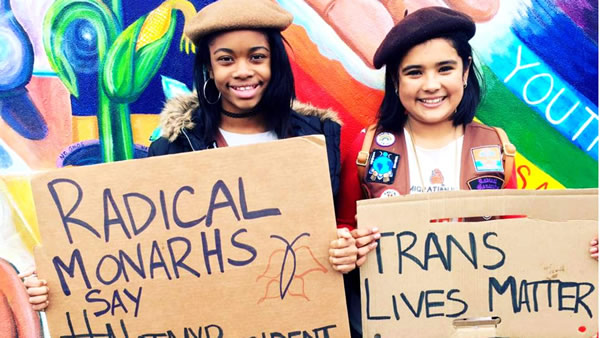Radical Monarchs create fierce sisterhood – Washington Blade

In the middle of a turbulent summer, the season opener for POV, the acclaimed documentary series on PBS, gives us something to celebrate and offers a badly needed moment of inspiration and hope.
The 33rd season of POV kicks off with “We Are The Radical Monarchs,” an excellent film by Linda Goldstein Knowlton about an innovative program to create and inspire a new generation of activists
The stirring film starts by showing the “Radical Monarchs” in action. A small group of Black and Brown girls with matching uniform pieces are silk-screening protest posters that read, “Education is Liberation.” As they work, they talk about what it means to be radical:
“Radical means just being yourself, what makes you unique, what makes you pretty, what makes you cool.”
“Fierce, strong, powerful, community.”
“You make a difference in the world. You’re not just sitting in the background.”
“Loud and proud.”
“Respecting others while you stand up for yourself.”
Knowlton then looks at the history—and future—of the program that helped shape these remarkable girls with their pride, confidence and caring.
The Radical Monarchs were founded in December 2014 in Oakland, Calif., by two queer women of color, Anayvette Martinez and Marilyn Hollinquest, to be a more inclusive and diverse alternative to traditional scouting organizations. They wanted to center the experience on girls of color and to develop opportunities to create fierce sisterhood, celebrate their identities and contribute radically to their communities. The participants range from ages 8 to 13.
As Hollinquest realized, “we need to teach social justice like we teach STEM subjects.” Instead of selling cookies, the girls earn badges for “Radical Pride, “Radical Bodies,” “Black Lives Matter,” “Radical Roots” and “Radical Beauty.” The film shows the girls learning about LGBTQ allyship, environmental racism and disability justice; meeting with an original member of the Black Panthers and joining in rallies and protest marches.
The girls also work on a “Radical Advocacy” badge by presenting testimony to the Oakland City Council and meeting with elected officials in the state capital of Sacramento.
Meanwhile, while Knowlton follows the first group of Radical Monarchs through their graduation from the program (and the 2016 election), she also looks at the time and money it takes for Martinez and Hollinquest to administer the troop. Both women are veteran activists and educators with full-time jobs and families of their own. Knowlton clearly shows the hard work that goes into lining up interesting guest speakers and developing age-appropriate curricula.
Knowlton also shows how interest in the program begins to spread. Commentators on Fox News are quick to denounce the program while parents across the country are interested in setting up their own troops. Martinez and Hollinquest are interested in expanding the program, but fundraising is a challenge.
Knowlton clearly has a fun time working with the Radical Monarchs and she quickly creates compelling capsule portraits of each of the girls. Their dynamic energy and inquisitiveness is infectious. It’s great to watch them dive into a group art project or to engage in a spirited discussion with one of the guest speakers. It’s sobering that young girls need to learn about police brutality; it’s inspiring to see them develop the confidence and tools to fight social injustice.
In the D.C. area, “We Are The Radical Monarchs” will air on WETA at 9 p.m. on Monday, July 20. The documentary will also stream on the website for the PBS POV series at pbs.org/pov/watch.
More information on the Radical Monarchs can be found on their website at radicalmonarchs.org.
The season premiere of POV will be followed by the season premiere of POV Shorts with three stories that reflect the many faces of love through memory, community and family. With great charm, “True Love in Pueblo Textil” introduces us to nine-year-old Maribel who tells us what it is like to fall in love. “When I Write It” is a love letter to the rapidly gentrifying Bay Area from two teenage artist natives who spend a day in creative and community fellowship. “La Lectora” captures the long-standing Cuban cigar factory tradition of a reader who entertains the cigar makers while they go about their work.